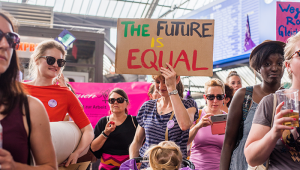It is among the few South Asian countries to have increased female employment in the last decade while slashing the wage gap between men and women, the World Bank says.
But women still have limited choices, control and decision-making power over their employment, finances and economic assets, the authors warn.
“Bangladesh has made great strides towards making men and women equal in many areas, particularly in health and education – but women need more economic empowerment,” said Robert Saum, Acting World Bank Country Director for Bangladesh and Bhutan.
“Bangladesh’s female labor force participation is lower than that of Nepal (80%) and Vietnam (77%) and lifting social and economic barriers will help the country unlock a significant part of the country’s productivity.”
The report, Voices to Choices: Bangladesh’s Journey in Women’s Economic Empowerment, points out that the female labour force participation rate in Bangladesh increased from 26% to 36% between 2003 and 2016.
However, women’s participation in the workforce is less than half of that of men, and more than one-third of women in the labour force are unpaid family helpers.
Gender gaps exist in the control over assets control, financial inclusion and entrepreneurship. For example, agricultural land ownership by men is about six times higher than ownership by women.
The report says Bangladeshi women have also fewer choices than men in where they save and borrow money, and have to hand over most of their earnings to their husband or family.
Only 36% of women have bank accounts, compared to 65% of men, and most do not control financial assets.
Female entrepreneurship is growing, but women-led businesses continue to be small and confined to specific sectors: only 1.7% of enterprises in the formal sector are owned by women, among the lowest rates in the world.
The report’s lead author, World Bank senior social development specialist Jennifer Solotaroff, said: “Women often face discrimination in job search, hiring, and promotion processes; in entering high-skill and management jobs; and in accessing credit and starting businesses. Ethnic minority women face even harsher discrimination.
“Our findings show that steps such as providing child care facilities, ensuring safe transportation, and encouraging girls to study science, technology, engineering, and mathematics will pave the way for more women to get quality jobs.”














